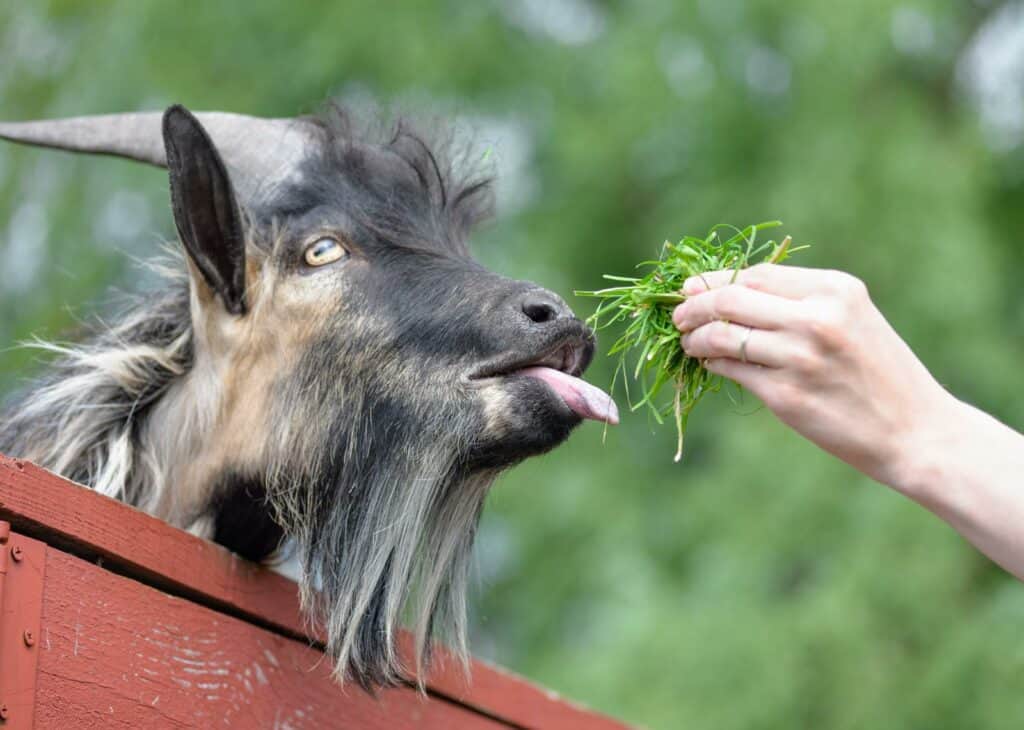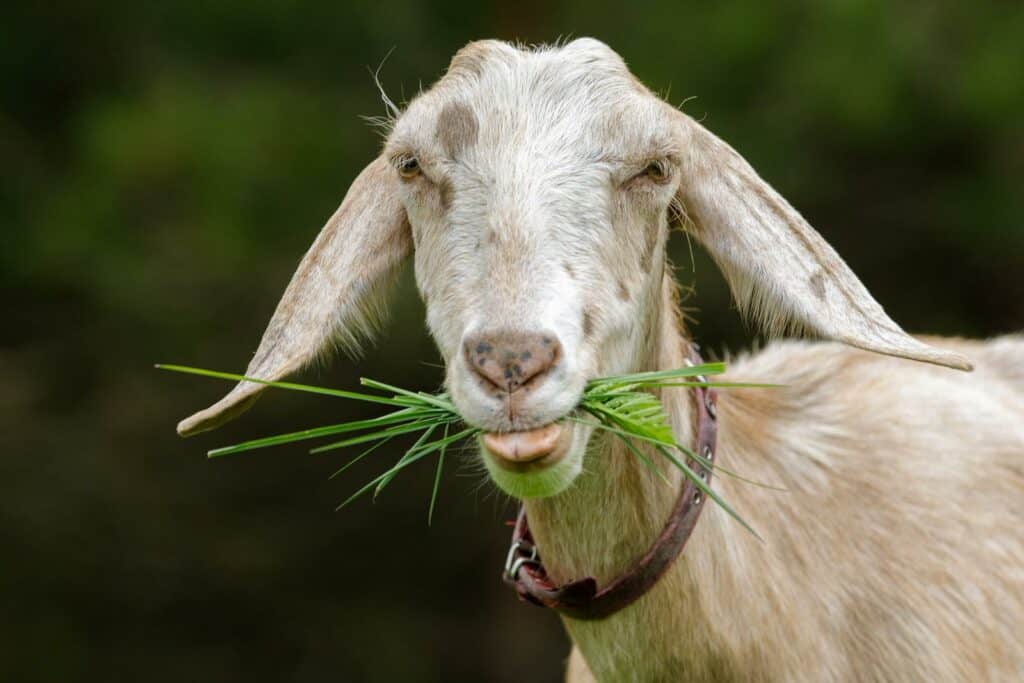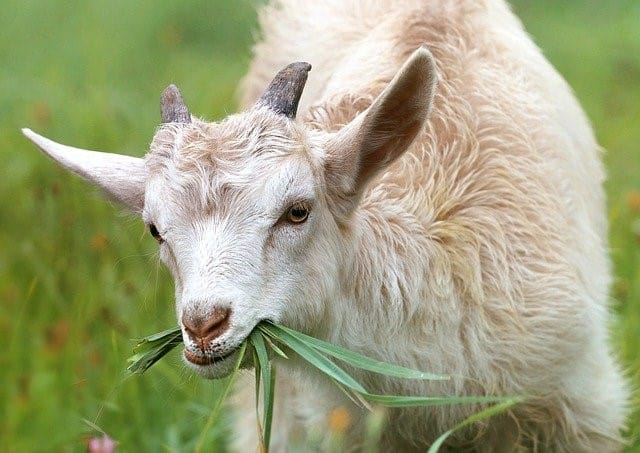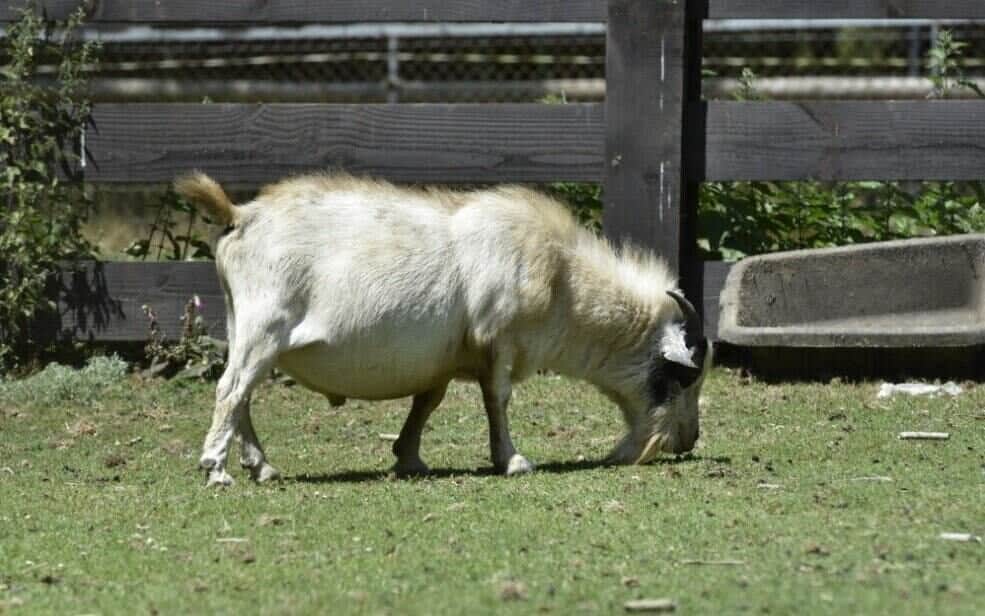Here we explain what to feed goats to gain weight. Goats are not the easiest animals to fatten, which you may realize if you raise them for meat. They are very active and will burn through calories like they are practicing for an upcoming CrossFit tournament. Dairy goats expend a lot of energy producing milk.
Understanding a goat’s nutritional needs is important for weight gain.
Here we will break down goat nutrition and how different food sources impact their health and weight to assist in diet selection when feeding goats to gain weight.
We will not dictate the supplementary feed but rather offer alternatives so that you can choose what works best for your farm. We realize that using locally available feeds fosters sustainability.
What to Feed Goats to Gain Weight
Essential food for goats to gain weight involves a combination of grains, protein, opportunities to browse and forage on pasture, and vitamins and minerals.
Grains for Carbohydrates
Grains like oats, corn, barley, and wheat are a great source of healthy carbohydrates and can significantly accelerate the fattening process. They also provide essential proteins, vitamins, and minerals for the goats’ health and development.
They are easy to serve as goats really enjoy them. This is why farmers often take advantage of grains to introduce essential minerals like ammonium chloride that the goats would not consume willingly (they are mixed into the grain). That and because grains are fairly inexpensive way to fatten up goats.

Benefits aside, animal health experts have cautioned against being excessively generous with the grain supply. They advise that you limit the amount of grains per adult goat to one and a half pounds in a day to prevent grain overload in their digestive system.
Pregnant goats can eat up to two cups because the extra proteins and fat will be applied to milk production and the development of the piglets. A half-cup is safe for kids (young goats).
The excess carbohydrates are not digested normally but will ferment in the goat’s rumen, triggering excessive lactic acid production. The possible adverse effects of such an overload include slowing down the gut processes, dehydration, grain poisoning known as acidosis, and death.
Feed Protein to Your Goats
Protein is an important nutrient for muscle development and growth in goats. They make absorption of other minerals easier.
Protein is readily available in corn, oats, peas, barley, hays, and other lush forages. Because consumption of some of these protein sources should be limited while some are limited in supply, you might be inclined to boost the protein intake.
This is where pellets like alfalfa pellets and meals like cottonseed and canola meals come in.

Letting the Goats Graze on Fodder
Goats rarely need intensive feeding systems because they get most of their dietary needs from regular browses, forbs, grasses, and the occasional insects they graze on. This is their natural way of eating and can be cost-effective. Grazing on pasture provides goats with essential fiber and nutrients.
Learn how many goats per acre you should raise to ensure your goats have enough calories and quality nutrition.
Hay, grass, and other pasture should constitute a huge chunk of the goats’ feed. They might occasionally come up short if you feed your goats to gain weight. The soil might not be nutritious enough to support the pasture.
Extreme weather also affects the growth of pasture, your goats might have flattened the entire farm, or the space might be too small for the size of your herd. What do goats eat

You should consider developing a hydroponic fodder system on the farm for your goats. It will enable you to keep providing succulent green fodder crops throughout the year despite the dynamic climatic conditions and limited grazing space. It involves growing these fodder crops in a controlled environment in nutrient-rich solutions instead of the soil to improve feed efficiency.
A hydroponic system supports all kinds of goat delicacies, from corn, rice, barley, and wheatgrass to sorghum. The goats can also graze on all parts of the plants, be it the leaves, grains, stems, or roots.
This enhances the optimization of the fodder if you consider that only the stems and roots are used in traditional soil fodder. Your fodder will not need to be supplemented as it grew up immersed in nutrients
We have a wholesome breakdown of hydroponics which you can refer to see how it may fit with feeding your livestock.
Minerals and Vitamins for Goats
The vitamins and minerals you need to provide for your goats vary depending on the rest of their diet. Their levels are high in some forages and low in others. You need to supplement what is lacking from the diet as they are important for the goats’ health and physiological systems.
Goat vitamins and minerals are easily accessible because feed stores stock them.
Vitamins
Vitamin C is a vital nutrient for goats. The goats synthesize it in their livers, but you need to administer it every once in a while to boost their immunity, like during freezing temperatures when they are prone to catching colds.
Goats may require vitamin B supplementation depending on their diet.
Vitamins C and B belong to the class of water-soluble vitamins that can easily be synthesized in the goats’ rumen but will occasionally need supplementation when the diet or other ailments interfere with their production.
Fat-soluble vitamins are essential for goats and may need supplementation. They include:
- Vitamin A is an important nutrient for goats.
- Vitamin D is necessary for the absorption and metabolism of calcium in the body which strengthens bones and teeth, promoting growth. It is special because some of it can be synthesized on the goat’s skin with the help of sunlight.
- Vitamin E is a vital nutrient for goats. It can be found in green grass, green sun-cured hay, or bought as a supplement.
Minerals
Calcium is essential for bone and tooth strength and development. It works best in combination with phosphorus, but a ratio of 2:1 has to be maintained. Other important macro minerals that should be included in the goats’ diet are magnesium, sodium, potassium, Sulphur, and chlorides.
The other group of minerals are micro minerals which include iodine, manganese, zinc, cobalt, copper, iron, selenium, molybdenum, and a host of others. Micro minerals form essential parts of hormones and enzymes; they aid in the formation of skeletal structures and activate various enzymes into action.
Mineral deficiencies can occur in goats, so supplementation may be necessary.
Keep Goats Active
Even though they will burn more calories being active than at rest, goats need to stay active. Romping and playing is important for their overall well being.
If you have a goat playground, they will enjoy climbing and exploring because they are curious animals. A play space will also promote socialization, help establish their hierarchy (like a pecking order for chickens), and helps to promote positive behaviors rather than destructive ones.
Being so active may help them build up an appetite as well!
How to Put Weight on a Goat
Whether you want goats to gain weight fast or are trying to get them to put more weight on gradually, maintaining body weight gain for goats is challenging even for farmers with years of experience. It can be especially important if you are raising meat goat breeds.
It involves a combination of food and farm management. The careful process requires dedication, resilience, and energy that can only be maintained with prior planning. This is why you should know what to feed goats to gain body weight before starting the project.
Proper feeds and supplements are not hard to find. The real challenge comes in balancing them when fattening your goats. Remember, all the food is going into the same stomach, which means some foods might interfere with the uptake of others.
No matter whatever goat breeds you are raising, whether you are raising goats for profit or for milk or meat for your family, goats require proper nutrition and care. If you want them to gain weight, fatten them up safely.
Learn more about goats:

